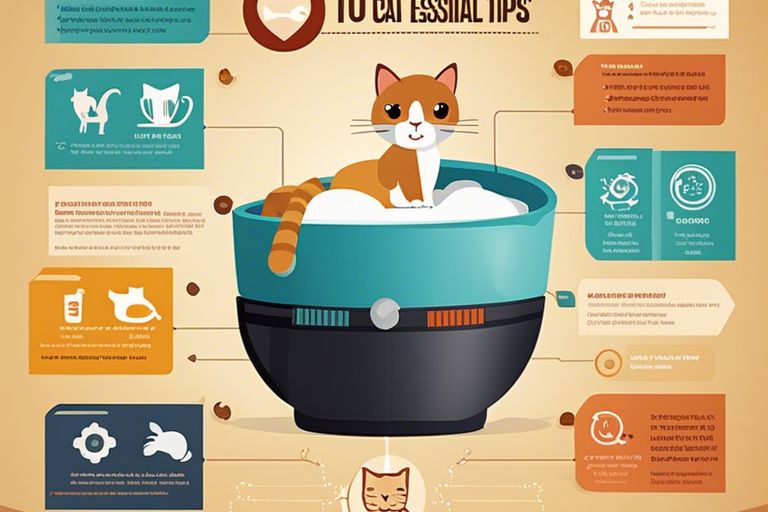Cat lovers entering the world of feline care may find themselves overwhelmed by the responsibilities that come with having a furry companion. As a cat parent myself, I can attest to the joys and challenges that come with caring for these independent creatures. In this listicle, we will explore ten imperative tips for cat care beginners to ensure that your feline friend leads a happy and healthy life under your care. From nutrition to grooming, let’s explore into the world of cat care and set you on the right path towards being a purr-fect cat parent.

Regular Vet Visits
While having a cat as a pet is a joyful experience, it also comes with the responsibility of ensuring their health and well-being. One of the key ways to do this is by scheduling regular vet visits.
Schedule Yearly Checkups
Assuming your cat is healthy and not showing any concerning symptoms, it’s still crucial to schedule yearly checkups with a veterinarian. These routine visits help in monitoring your cat’s overall health and catching any potential issues early on.
Monitor Health Changes
Some signs that your cat may be experiencing health changes include changes in appetite, behavior, litter box habits, or grooming routine. If you notice any of these changes, it’s important to consult with your veterinarian to rule out any underlying health issues.
Visits to the vet are not just for when your cat is sick; preventive care is equally important. Your vet can provide guidance on vaccinations, parasite control, dental care, and nutrition to ensure your cat leads a healthy and happy life. Note, regular vet visits are crucial in maintaining your cat’s well-being.
Balanced Nutritious Diet
Age-Appropriate Food
Some cat owners may not realize the importance of providing age-appropriate food for their feline companions. Just like humans, cats have different nutritional needs based on their life stage. Kittens, adult cats, and senior cats all require different levels of proteins, vitamins, and minerals to support their growth and health. It is imperative to choose cat food that is specifically formulated for your cat’s age group to ensure they receive the necessary nutrients for their well-being.
Limit Treat Intake
You’ll want to be mindful of the amount of treats you give your cat. While treats can be a fun way to bond with your feline friend and reward good behavior, overindulgence can lead to obesity and nutritional imbalances. On top of their regular food, treats should make up only a small portion of your cat’s diet. It’s best to opt for healthy, low-calorie treats and limit them to occasional rewards rather than daily indulgences.
Any changes to your cat’s diet should be made gradually to prevent digestive upsets. If you are unsure about what treats or how much to give your cat, consult with your veterinarian for personalized recommendations based on your cat’s age, weight, and health status.
Keep Vaccinations Updated
Follow Vet Recommendations
You must follow your vet’s recommendations when it comes to scheduling and administering vaccinations for your cat. Vaccinations are crucial in preventing deadly diseases and keeping your furry friend healthy. Your vet will create a personalized vaccination schedule based on your cat’s age, lifestyle, and health status. It’s crucial to stay on top of these vaccinations to ensure your cat is protected at all times.
Prevent Common Diseases
An crucial part of cat care is preventing common diseases through vaccinations. Vaccines protect your cat from serious illnesses such as feline leukemia, rabies, and distemper. By keeping your cat up to date on vaccinations, you can significantly reduce their risk of contracting these diseases. Preventive care is key to ensuring your cat lives a long, healthy life.
Maintain Healthy Weight
Regular Exercise Routine
Many cat owners may not realize that maintaining a healthy weight is crucial for their feline companions. Just like humans, cats can suffer from obesity-related health issues if they are overweight. One of the key ways to help your cat stay at a healthy weight is by ensuring they have a regular exercise routine.
Avoid Overfeeding
Healthy weight management for cats also involves avoiding overfeeding. It can be tempting to give in to those pleading eyes when your cat looks for extra treats or begs for more food, but overfeeding can quickly lead to weight gain. It’s important to stick to the recommended feeding guidelines provided by your veterinarian and not give in to overfeeding your cat.
Avoid free-feeding your cat and instead opt for measured portions at designated meal times. This can help prevent your cat from consuming more calories than they need and maintain a healthy weight.
Groom Regularly
Brush Fur Often
Any cat owner knows that cats shed, some more than others. To prevent mats and hairballs, it’s crucial to brush your cat’s fur regularly. Not only does this help to keep their coat healthy and shiny, but it also strengthens your bond with your feline friend. Make it a fun and relaxing experience for your cat by using a soft brush and gentle strokes.
Check for Parasites
Any responsible cat owner should regularly check their furry companion for parasites like fleas and ticks. These pesky little critters can cause discomfort and even transmit diseases to your cat. With a comb specially designed to detect parasites, part your cat’s fur and inspect their skin closely. If you spot any parasites, consult your veterinarian for the best course of action.
With proper grooming and regular parasite checks, your cat will not only look good but also stay healthy and happy. Recall, prevention is key when it comes to your cat’s well-being.
Litter Box Maintenance
Clean Daily
There’s no escaping the fact that a clean litter box is vital for your cat’s health and happiness. Make sure to scoop the litter box at least once a day to remove any waste. This will also help in preventing any unwanted odors from building up and keep your cat coming back to use the box regularly.
Provide Privacy
Clearly, cats value their privacy when using the litter box. Place the litter box in a quiet and secluded area in your home where your cat can do their business without feeling exposed. This will help reduce any stress or anxiety your cat may feel and encourage them to use the litter box consistently.
Maintenance
Regular maintenance of the litter box is crucial for the well-being of your cat. Apart from daily scooping, it’s important to completely change the litter and clean the box with mild soap and water on a regular basis. This will provide a fresh and hygienic environment for your cat to use the litter box comfortably.

Provide Fresh Water
Refill Water Daily
On a daily basis, it is crucial to refill your cat’s water bowl with fresh, clean water. Cats, just like humans, need access to clean water to stay hydrated and maintain their health. Remember to wash the water bowl with mild detergent and rinse thoroughly before refilling to prevent bacteria growth.
Clean Water Bowls
The water bowl should be cleaned regularly to ensure a clean drinking environment for your feline friend. It is recommended to wash the water bowl with hot, soapy water at least once a day, especially if you notice any debris or slime buildup. This practice helps to prevent bacterial growth and keeps the water fresh for your cat to enjoy.
Water is important for cats to aid digestion, regulate body temperature, and keep their skin and coat healthy. By providing fresh water daily and maintaining clean water bowls, you are ensuring the well-being of your beloved cat. Bear in mind, a hydrated cat is a happy and healthy cat!
Safe Environment
Now that you’ve brought a new furry friend into your home, it’s crucial to ensure their environment is safe and free of any potential hazards. Here are some important tips to create a secure environment for your feline companion.
Remove Toxic Plants
Remove any toxic plants from your home that could be harmful to your cat if ingested. Common plants like lilies, poinsettias, and philodendrons can be toxic to cats and should be kept out of reach or replaced with pet-friendly alternatives.
Secure Loose Cords
While cats are known for their curiosity and love of playing with objects, loose cords pose a serious risk to their safety. Keep cords from blinds, electronics, and appliances secured and out of reach to prevent your cat from getting tangled or chewing on them, which could lead to injury or even electric shock.
It’s important to regularly inspect your home for any potential hazards and take measures to eliminate them to create a safe and healthy environment for your new feline companion. By being proactive and attentive to your cat’s surroundings, you can prevent accidents and ensure a happy and secure home for your beloved pet.
Behavior Training
Use Positive Reinforcement
To effectively train your cat, use positive reinforcement techniques. Cats respond well to rewards such as treats, praise, and attention when they exhibit good behavior. When your cat uses the scratching post instead of the furniture or uses the litter box properly, make sure to reward them immediately. This will help them associate their actions with positive outcomes and encourage them to repeat the desired behavior.
Set Boundaries Early
Even though cats are independent animals, it’s crucial to set boundaries early on to establish a harmonious relationship. Decide where your cat is allowed to go in the house, where they can scratch, and where they should sleep. Use gentle redirection techniques such as providing scratching posts in designated areas or using deterrents like double-sided tape to discourage unwanted behavior. Consistency is key in enforcing boundaries with your cat.
Early training and consistent reinforcement of boundaries will help your cat understand what is expected of them in their new environment. Be patient and remain calm during the training process, as cats can be sensitive to changes and might take some time to adjust. Note, establishing clear boundaries will ultimately lead to a happy and well-behaved cat.
Socialization and Play
Interactive Toys
With the right interactive toys, you can keep your cat entertained and mentally stimulated. Toys like puzzle feeders, laser pointers, and treat-dispensing balls can provide hours of fun for your feline friend. Remember to rotate the toys regularly to prevent boredom and keep your cat engaged.
Regular Playtime
Regular playtime is necessary for a happy and healthy cat. Set aside time each day to engage in interactive play with your feline companion. Use a variety of toys to mimic natural hunting behaviors and keep your cat active. Interactive play not only strengthens your bond with your cat but also helps prevent behavior issues that can arise from boredom or pent-up energy.
Conclusion
Following this comprehensive guide of 10 important tips for cat care beginners will ensure that you provide the best care for your feline companion. From nutrition and grooming to veterinary care and environment, these tips cover all the basics to keep your cat healthy and happy. By implementing these practices, you can create a loving and safe home for your new furry friend.




